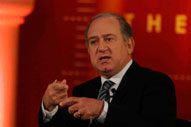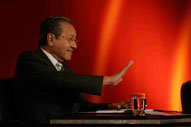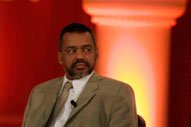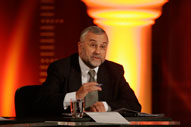This House believes in the separation of mosque and state
Tuesday November 30 2004
MOTION PASSED
Speakers
Tarek Heggy
Speaking for the motion
Tarek Heggy has earned a reputation as a leading liberal political thinker in the Arab world. Since 1978 he has authored 14 books in Arabic, as well as countless essays in Arabic, French and English. His work advances the causes of modernity, democracy, tolerance and women's rights in the Middle East. He is a regular guest on Arabic television and radio.
Among his published works in Arabic are 'Marxist Ideas in Balance' (1978), 'Communism and Religion' (1980), 'Reflections on Egypt's Realities' (1995), 'Critique of the Arab Mind' (1998), 'Culture First and Foremost' (2000) and 'The Values of Progress' (2001). A collection of his work in English, titled 'Culture, Civilization & Humanity', was published in 2003.
With more than 30 years as international petroleum strategist for Shell and other oil-producing companies, Heggy also has written about strategies to exploit natural gas in the Middle East in relation to the region's political and economic future. He is on the board of numerous organizations and universities, including the Faculty of Economics and Political Sciences of Cairo University and the RAND Center for Middle East Public Policy's Initiative for Middle Eastern Youth.
Tun Mahathir bin Mohamad
Speaking against the motion
Tun Dr. Mahathir bin Mohamad served as prime minister of Malaysia from 1981 to 2003. He is credited with having transformed Malaysia's economy from agriculture-based to industry-based and elevating Malaysia to the position of 17th biggest trading nation in the world. Under his leadership, Malaysia also played a prominent role in the international arena.
Dr. Mahathir is currently the chairman of the Organisation of Islamic Conferences and the Non-Aligned Movement as well as the author of 'The Malay Dilemma, The Way Forward, The Challenge, The Malaysian Currency Crisis and Globalisation and the New Realities'. He has also authored several books which discuss issues affecting the Muslim world, including 'The Role of Islam in the Modern State' and 'Islam and the Muslim Ummah'.
Following his retirement, Dr. Mahathir was conferred the nation's highest award, Seri Maharaja Mangku Negara, which carries the title "Tun," in recognition of his immense contribution to his country.
Abdelwahab El-Affendi
Speaking for the motion
Dr. Abdelwahab El-Affendi is a senior research fellow at the Centre for the Study of Democracy, University of Westminster, and co-ordinator of the Centre's 'Democracy and Islam' Programme.
He is the author of 'Turabi's Revolution: Islam and Power in Sudan' (1991), 'Who Needs an Islamic State?' (1991), 'Revolution and Political Reform in Sudan' (in Arabic) (1995), 'Rethinking Islam and Modernity' (2001), 'Islam and the Modern State' (in Arabic) (2002), and 'For a State of Peace: Conflict and the Future of Democracy in Sudan' (2002). He also has contributed to numerous journals and academic publications.
Dr. El-Affendi is a member of the Consultative Council of the Arab Human Rights Organisation in the UK, and a trustee of the International Forum for Islamic Dialogue (UK).
Laith Shubeilat
Speaking against the motion
Laith Shubeilat was born in Jordan in 1942, and was educated at the American University of Beirut and George Washington University in Washington, D.C., where he earned a master's degree in structural engineering.
Upon returning to Amman in 1968, he joined a Sufi order which he says helped him to reconcile his outward life with a newly awakened devotion to his faith. He eventually became the first Islamist to serve as president of the Jordan Engineers Society.
The late King Hussein appointed him to the National Consultative Council which led to a successful run for parliament. In parliament, he headed the highest judicial committee where his investigations of former ministers led to his own arrest for an alleged coup d'etat - which eventually resulted in an amnesty. In 1993, he bowed out of politics, disillusioned with the deterioration of political life in Jordan.
He was elected to three more terms as president of the Engineers Association, once while incarcerated for criticizing the late King Hussein in 1996. He was jailed again for nine months in 1998. Though retired from the engineering profession, he continues to consult for the architectural engineering firm that he established more than 25 years ago.
